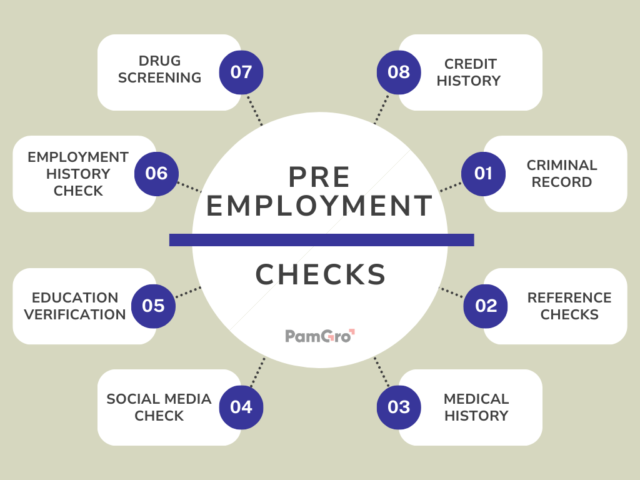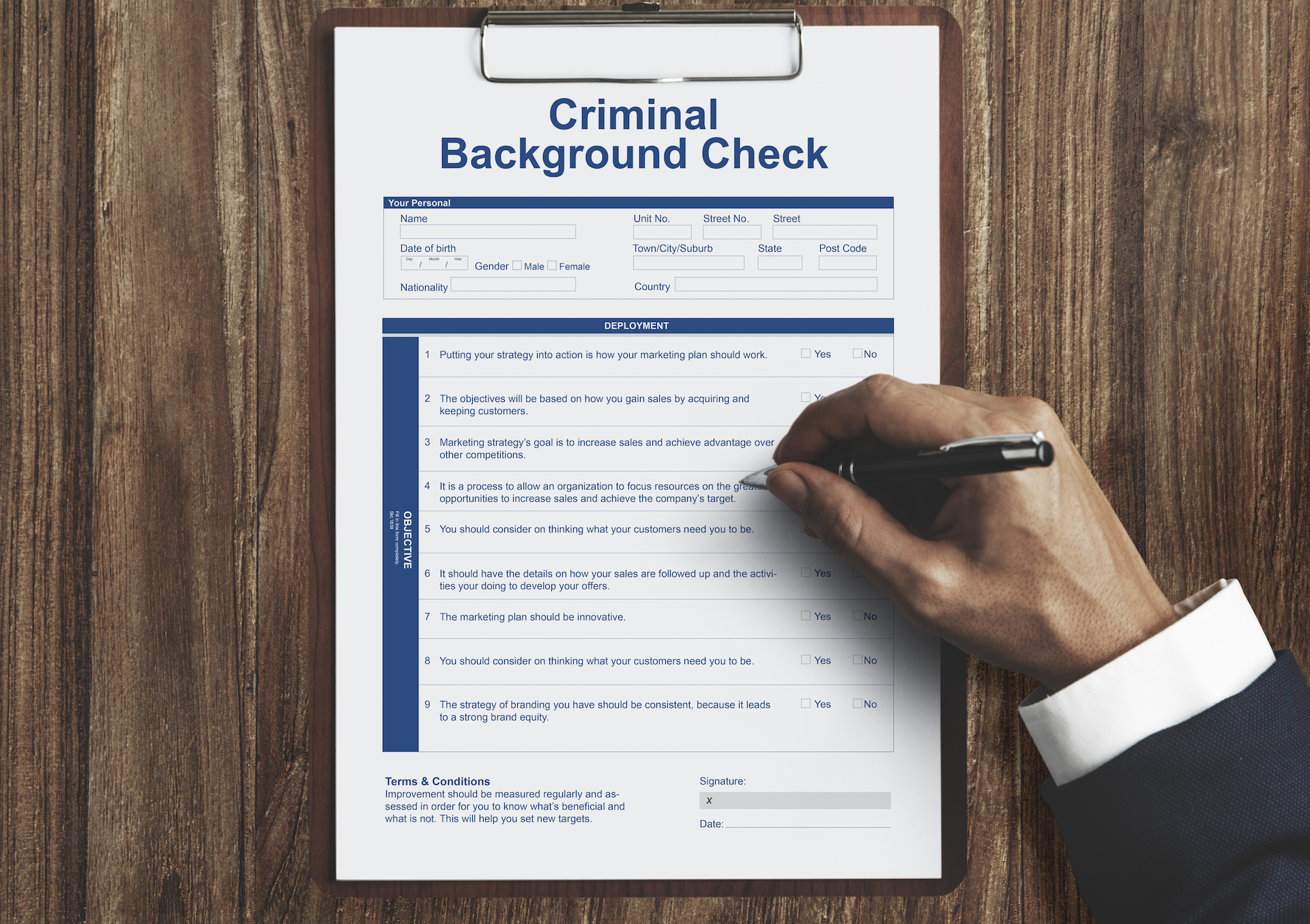TABLE OF CONTENTS
- What are pre employment checks?
- Why are pre employment checks important?
- How should pre-employment screening checks be conducted?
- Benefits of Pre-employment Screening Checks for Employers
- Best Practices for Pre-employment Screening Checks
- Understanding Pre-employment Screening Checks for Employees
- Tips for Navigating Pre-employment Screening Checks
- FAQs
For employers, pre-employment screens can help manage risk, ensure compliance with laws and regulations, and create a safe and productive work environment. For employees, these checks can impact their chances of getting a job, advancing in their career, or maintaining their reputation. Therefore, it is crucial for all parties involved to have a thorough understanding of pre-employment screening checks. Whether you are an employer looking to improve your hiring process or an employee navigating the screening process, this blog aims to provide you with all the details, knowledge and insights needed to make informed decisions.
In this article, we will delve into pre-employment screening checks, examining them from the standpoint of both employers and employees.
What are pre employment checks?
Pre-employment screenings encompass a range of evaluations carried out by employers to verify the qualifications, integrity, and suitability of potential job candidates before making a final job offer. These assessments are designed to minimize risks, enhance workplace safety, boost productivity, and ensure compliance with regulations by the hiring organisation. Some of the common pre-employment checks include:
- Identity authentication: Confirming the candidate’s identity, often through the use of a passport, driver’s license, or national ID card.
- Criminal background check: Examining the individual’s criminal history, if any, to assess potential risks associated with their employment.
- Credit report examination: Assessing the candidate’s financial well-being, primarily for positions involving the handling of money or sensitive data.
- Reference verification: Contacting previous employers, educators, or other professionals mentioned by the candidate to validate their work history, skills, and achievements.
- Verification of educational degrees: Validating the educational accomplishments claimed by the candidate, either by directly contacting the institutions attended or utilizing specialized services.
- Verification of professional licenses and certifications: Ensuring that the candidate possesses the necessary valid credentials required for the job.
- Drug testing: Conducting screenings for drug use, as mandated by certain industries or organizations aiming to maintain a safe work environment.
- Analysis of social media presence: Evaluating online activities and presence to assess character traits, behaviors, and alignment with the company’s culture.
- Skills assessment tests: Measuring proficiency in crucial job-related abilities through standardized evaluations or tailored tasks.
- Personality and aptitude tests: Assessing cognitive abilities, personality traits, emotional intelligence, and cultural compatibility through psychometric assessments.
By conducting thorough pre-employment checks, employers can build stronger teams, cultivate safer work environments, and instill greater confidence in their investments in human capital.
Why are pre-employment checks important?
Pre-employment checks, commonly referred to as background checks, play a vital role in the hiring process. They enable employers to validate the authenticity of details provided by job applicants and detect any possible warning signs that may suggest unsuitability for the position. Nevertheless, these checks can also give rise to apprehensions among job seekers who are concerned about their privacy and the potential consequences of past errors on their future professional opportunities.
Types of Pre-employment Screening Checks:
To work in the UK, there are several different types of pre-employment screening checks that employers can use to assess potential hires. Here are some of the most common ones:

- Reference Checks:
Reference checks involve contacting previous or current employer, employers or educational institutions to verify employment dates, job titles, and qualifications claimed by the candidate. They can provide valuable insights into a candidate’s reliability, performance, and behavior in the workplace.
- Right to Work Checks:
It is illegal to employ someone who does not have the right to work in the UK (without work permit, or a work visa). As such, employers must conduct right to work checks on all prospective employees. This involves examining original identity documents, such as passports or visas, to confirm that the person has valid permission to live and work in the country.
- Credit Checks:
Some employers may choose to conduct credit checks as part of their pre-employment screening process. These checks look at an individual’s financial history, including debt levels, bankruptcies, and court judgments. While credit checks are more commonly used in certain industries, such as finance and banking, they can be useful in any role where financial management is a key component.
- Criminal Record Checks:
A criminal record check, also known as a DBS check (Disclosure and Barring Service), is a search of an individual’s criminal history. There are three levels of DBS check: basic, standard, and enhanced. A basic check will reveal only unspent convictions, while a standard check will show both spent and unspent convictions, cautions, reprimands, and final warnings. An enhanced enhanced criminal record check however, which is typically required for roles involving work with children or vulnerable adults, will also include any relevant police intelligence.
- Other Types of Checks:
Depending on the industry and the specific job role, other types of pre-employment screening checks may be necessary. For example, healthcare professionals may need to undergo fitness-to-practice checks, while those working in transportation may require driving license checks. It’s important for employers to consider the specific requirements of each role when deciding which checks to carry out.
How should pre employment checks be conducted?
Employers must exercise caution when conducting pre-employment screening checks to prevent any legal or criminal records or ethical issues. It is crucial to focus on several key areas, including:
1. Right-to-work checks: Employers should ensure that their employees have the legal authorization to work in the respective country. Manual checks involve verifying original documents, ensuring their authenticity, and maintaining proper records. Alternatively, online checks of immigration status can be conducted using the Home Office’s online right-to-work checking service. Failure to comply with these requirements may result in the loss of statutory excuses for employing individuals who are not legally permitted to work.
2. Criminal background checks: Individuals can apply for basic checks themselves through the DBS website, or employers can do so with the candidate’s consent. For standard or enhanced checks, the recruiting organization must initiate the process through a registered body. The level of disclosure in these checks depends on the nature of the role being considered.
3. Medical checks: Employers should inform candidates about any medical requirements and obtain their written consent before requesting a medical report, from their General Practitioner (GP).
4. Reference checks: Typically, candidates provide the names and contact details of referees, allowing employers to directly reach out for information. Essential details to gather include employment dates, job roles, main responsibilities, attendance records, and any valid reasons why the candidate should not be hired. Maintaining consistency in the employment reference checking process is crucial to avoid any allegations of discrimination.
Benefits of Pre-employment Checks For Employers
There are many benefits to conducting pre-employment screening checks, including:
- Protecting Your Company: Background checks play a crucial role in mitigating the risk of negligent hiring lawsuits by identifying candidates who may pose a potential threat or lack the necessary qualifications before they are hired as employees.
- Improving Productivity: Conducting comprehensive screenings can aid in guaranteeing that newly recruited employees are a good fit for their respective positions, thereby minimizing employee turnover and enhancing overall productivity.
- Maintaining Reputation: Conducting thorough due diligence throughout the hiring process can effectively protect your company’s reputation and prevent any adverse publicity that may arise from making inadequate hiring choices.
Best Practices for Pre-employment Background Checks
If you decide to incorporate pre employment checks into your hiring process, here are some best practices to keep in mind:
- Obtain Consent: It is imperative to acquire written consent from job applicants prior to conducting any form of background check.
- Follow Legal Guidelines: It is crucial to familiarize oneself with the legal regulations pertaining to pre-employment screening checks, especially those concerning protected attributes such as race, gender, and age.
- Be Transparent: The purpose and extent of the background check should be clearly and concisely communicated to the job applicant.
- Handle Sensitive Information Securely: Make sure that all personal information gathered during the employment checks is securely stored and appropriately disposed of.
For Employees: Understanding Pre-employment Screening Checks
Job seekers should understand what pre-employment screening checks entail and how they can affect their chances of getting hired. Here are some things to keep in mind:
- Types of Checks: Common types of pre-employment screening in the UK include criminal record checks, reference checks, credit checks, and right to work checks.
- Impact on Job Prospects: Depending on the results of the check, past mistakes or indiscretions could negatively impact job prospects. However, recent changes to UK legislation mean that employers cannot automatically reject candidates based solely on a criminal conviction unless it is “relevant” to the role.
- Privacy Concerns: Some job seekers may have concerns about the privacy implications of pre-employment screening checks. It’s important to note that employers must obtain explicit consent before conducting any kind of background check.
Tips for Navigating Pre-employment Screening Checks
Here are some tips for navigating pre employment background checks as a job seeker during the recruitment process:
- Be Honest: Lying on a job application or resume is never a good idea. If a discrepancy is discovered during a background check, it could jeopardize your chances of being hired.
- Check Your Own Records: Before applying for jobs, consider obtaining copies of your own criminal record, credit report, and other relevant records. This can help you address any issues proactively and correct any errors.
- Understand Your Rights: Familiarize yourself with your rights regarding pre-employment screening checks and know what recourse is available if you feel that an employer has acted unfairly or illegally.
Pre-employment screening checks are crucial in the recruitment processes as they allow employers to verify the accuracy of information provided by job applicants and help mitigate risks related to safety, security, and compliance. However, employees also have valid concerns about privacy and the potential impact of past mistakes on their future career prospects.
To navigate this complex situation, it is essential for both employers and employees to approach pre-employment screening checks with transparency, honesty, and respect for each other’s needs and interests. Employers should establish clear policies and procedures regarding these checks, communicate them effectively to job applicants, and handle sensitive information securely and responsibly. On the other hand, prospective employee should be prepared to answer questions truthfully and take necessary steps to address any issues that may arise during the screening process.
Recent changes in UK legislation demonstrate the growing recognition of the importance of striking a balance between thorough background checks and protecting individual privacy while promoting social inclusion. By staying informed about current laws and trends, both employers and employees can contribute to a fair and equitable hiring process that enhances public safety, supports economic growth, and fosters positive relationships between job seekers and employers. Ultimately, effective pre-employment screening and criminal records checks benefit everyone involved by creating safer and more productive workplaces, as well as stronger communities.
FAQs
1. Can I withdraw a job offer after pre-employment checks?
Generally, employers have the right to revoke a job offer after conducting pre-employment checks. However, it is crucial to provide proper justification and consideration to avoid reputational damage and potential legal issues. The following steps could be taken after the decision is made:
- Document reasons for revocation & seek legal advice.
- Promptly notify the applicant via formal channels, citing valid reasons.
- Safeguard privacy and confidentiality throughout the process.
- Mitigate damages through transparency and strong internal review.
- Improve recruitment policies based on lessons learned.
2. How long do pre-employment checks take in the UK?
The duration of pre-employment checks in the United Kingdom usually spans from one to four weeks. This timeframe is subject to several factors, including the intricacy of the position, the quantity of references to be contacted, and the specific type of screening necessary (such as criminal record checks or credit history checks).
Employers are advised to furnish an approximate timeline for these checks during the recruitment phase. Nevertheless, it is important to acknowledge that delays may arise due to administrative factors or the response times of third-party entities.
3. What would make someone fail a pre employment background check?
There are multiple factors that can lead to an individual failing a pre-employment background check, which includes but is not limited to :
- Inconsistencies or discrepancies identified in their resume, cover letter, or application materials.
- Possession of a criminal record that is relevant to the position they have applied for, particularly when it involves handling sensitive data, working with vulnerable populations, or necessitates security clearance.
- Unfavorable findings from credit reports, especially if financial responsibility is a critical requirement for the role.
- Provision of false or misleading information by listed references.
- Verification problems concerning academic degrees, professional licenses, acceptable documents or certifications.
- Uncovering of dishonesty or fraudulent behavior during previous employment.
To prevent failing a pre-employment background check, it is crucial to maintain accuracy and honesty throughout the entire hiring process. Additionally, it is important to disclose any employment history or potential concerns upfront to maintain transparency with the employer.
Payroll Solutions Unrivalled since 15 Years







